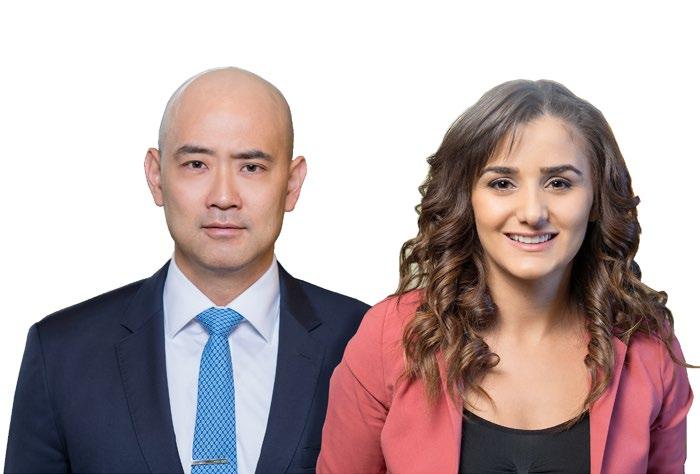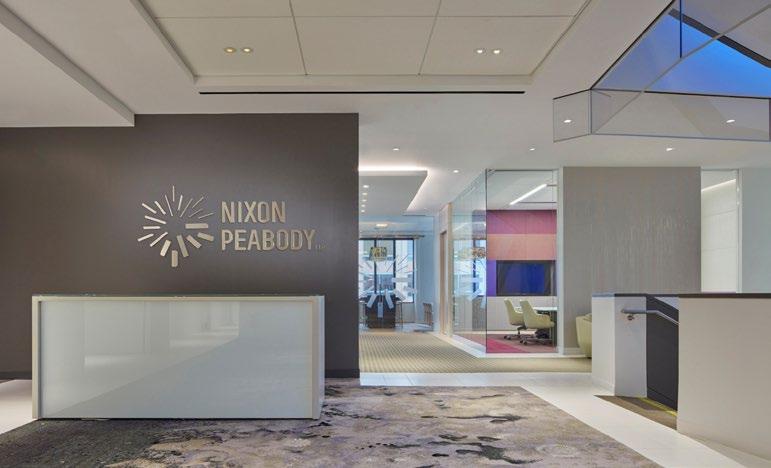
7 minute read
Nixon Peabody
Ask the Esports Lawyers
AUTHOR Nixon Peabody LLP @NixonPeabodyLLP
Advertisement
Esports is an ever-changing landscape. With the industry growing at such an alarming rate, there’s always bound to be teething problems. Esports is still in the process of professionalising fully, and thus there’s still plenty of examples of business malpractice across the space. W
We spoke to Irene Scholl-Tatevosyan, a labour and employment associate and a complex commercial litigator at Nixon Peabody, and Benjamin Kim, a partner in Nixon Peabody’s Labor & Employment group who offered their thoughts and expertise on some of the most pertinent issues in esports at present.
The Esports Journal: What are some of the most pressing legal issues right now in esports? Irene Scholl-Tatevosyan: One of the biggest issues will be (and to an extent already is) unionisation in esports. Unionisation in sports generally has been a bit messy, but with esports, it becomes more complicated as there are different game publishers who own the game being played itself. Another issue is governance—in other words, how to govern this industry as there is no set structure outside of the prominent game publishers creating their own structure—as well as regulatory compliance—such as with the FTC, which prohibits unfair or deceptive acts or practices in
marketing. Of course, IP is huge for any industry that touches on technology, like esports, and we see those issues playing out in recent litigation.
Benjamin Kim: The employeeindependent contractor issue is another concern on the labour and employment side, especially in states like California where, based on recent precedent, it is even more challenging—though not impossible—to classify workers as independent contractors instead of employees. This is particularly important for rapidly growing markets such as esports. How esports companies—which often have many facets of their business and crossover into many different industries—deal with their talent and how teams deal with their players create issues we are seeing play out in real time. Gambling related to esports is also a big one as the regulatory landscape continues to change statewide and federally.
ESJ: How do you see the industry changing? Irene: It will continue to grow, not just in audience but with more structure.
I think the big players are here to stay, but it will be interesting to see whether there will be another Riot or Blizzard — I think there will be. Eventually, we may see A/R and V/R have more of a role in esports as well, but we may be farther away from that future. Esports is here; I see it becoming more of a behemoth. For example, I see esports being a norm—in schools, in community activities, etc. The next phase will include a set structure for the esports player to go from an amateur to a semi-pro to a pro. It will include more college and high school programs that focus on esports as a career—not just for professional players—for programmers, business managers, and all sorts of professionals.
Ben: I think we’ll see formalisation of the esports market, and the legal issues surrounding it, as well as more guidance, either in the form of new laws or regulations. But esports is a multi-dimensional market with so many different industries at play. With everchanging technology as the backbone of esports competitions, new industries will undoubtedly form.
ESJ: Irene, you are one of the drivers of the women in gaming initiative in Southern California. Tell us about that. Why was it important? Irene: I was lucky enough to meet and speak to many wonderful women in esports who are really making great changes and strides within their respective companies. What we realised was missing, at least in Southern California, was something to bring all these women together to form a community, not just to mentor and promote one another, but to show the next generation that it is possible for a woman to make it in gaming and here are the various paths you can take.
This is important because if a girl wants to enter gaming, she needs to know it is a career option. She needs to know what that looks like and how to get to her goals. And, for those of us in the industry, we need to make a concerted effort to continue to support and promote one another so that we each get to the next level.
ESJ: Do you think we will see the formation of a proper players’ union across games, and how would that deal with issues such as the current situation with Denial reportedly not paying players? Irene: This is a difficult one—maybe. A players’ union must come from the players themselves. A company or team cannot be involved in that process. A players’ union is unlikely over esports generally because each game is owned by a different publisher. So, for example, we may see a LoL union and a separate Overwatch union but not an overarching esports union. If we do get a players’ union in one of the games, the path to unionisation will be as rocky as it has been with traditional sports. Assuming there is a union and a collective bargaining agreement (CBA) comes through, the players, teams, and publisher will be bound by the terms and conditions set forth in that agreement until it is time to bargain again—and even then the status quo must be maintained until there is a new agreement. Assuming a CBA, I assume there will be penalties for a team not paying its players and a grievance process that players could use to address the situation.
ESJ: How can teams better safeguard their players from being poached by other organisations? Ben: Most of these protections will be in the form of contractual provisions. Where there is collective bargaining, you may see protections similar to those that you see in the NFL, NBA, etc. Esports, however, may have talent in a variety of different forms and locations. Given that the talent, even for a single competition, can span across different jurisdictions, there will be challenges in how these contractual provisions are interpreted, enforced, and litigated.
ESJ: How did you personally get involved in esports? Do you play? Irene: I was and am a gamer. At some point, I would play up to ten hours, if not more, per day. I love gamer culture and the games themselves—so gaming was something I was always passionate about. So, when I learned there is a competitive gaming landscape years ago, I was beyond excited and knew I had to get involved—not just as a
consumer but as a professional in the industry. That is how the esports initiative grew at Nixon Peabody— passionate gamers looking to apply their legal skills to a truly exciting industry. I play, though not as often as I like on account of having to keep my day job! I still play Street Fighter and am back at it with the new Kingdom Hearts.
Ben: I’ve always loved gaming, but I didn’t fully realise the future of esports until I witnessed how my kids consume entertainment. They could not be less interested in watching the NBA or NHL playoffs. Instead, they want to watch someone play a video game on YouTube. When I think of my kids, I see the future of consumers in their generation; they’re not watching traditional TV anymore.

They’re consuming a lot of esports-like entertainment.
I grew up playing and watching traditional sports, and my mindset was that you only played video games but did not see them like any other form of entertainment. Then, I remembered watching high-level gamers compete in Street Fighter at the local arcade. With so many advances in technology and communication, those crowds that formed at the local arcade have grown to seemingly infinite numbers online and across the world. I remember watching a TV show a few years ago where the country’s top players in Madden NFL games competed, and thought, this could apply to any popular video game.
This article is meant for informational purposes only, and readers should consult a lawyer with questions.
Benjamin J. Kim and Irene Scholl-Tatevosyan colead Nixon Peabody’s esports group.
Benjamin J. Kim, a partner in Nixon Peabody’s Labor & Employment group and a member of the firm’s Occupational Safety & Health (OSHA) practice. He represents clients in a range of industries in employment and labour matters in both federal and state court litigation. He also counsels employers on a wide variety of employment issues.
Irene Scholl-Tatevosyan is a labour and employment associate and a complex commercial litigator. She represents employers in all aspects of labour and employment matters, including in ERISA litigation matters and in representation before the NLRB, and works on high-stakes commercial litigation.





